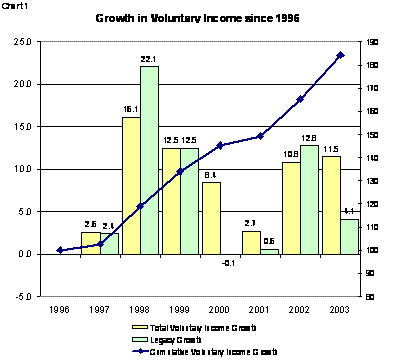Long-term impact of tsunami appeal could be beneficial, says Institute survey

An online survey by the Institute of Fundraising has found that, despite worries about the tsunami appeal’s short-term impact, 84% of charities think that the appeal could, in some way, positively impact their organisation over the long-term.
The Institute has announced the results of its first survey of members’ reaction to the remarkable success of the recent tsunami emergency appeals.
Lindsay Boswell, Chief Executive of the Institute of Fundraising, said: “while it’s too early to identify the long-term effects of the tsunami appeal on UK charities, it’s clear that organisations are largely concerned about how the tsunami appeal has affected their bottom line over the short term, but recognise the longer-term, sector-wide benefits of such a large-scale fundraising initiative.
Advertisement
“The challenge now is for charities to capture the giving momentum and sector-wide positive attributes of increased awareness of charities and of Gift Aid in a big enough way to over-ride any negative impact of reductions in donations on an organisation-by-organisation basis.”
The Institute asked fundraisers about the short-term effect of the tsunami appeal. Nearly nearly 40% respondents had noticed a change in income over the past month: 21.2% respondents cited a decrease in income (averaging 30%) and 18.4% report an increase in income (averaging 40%). Of those organisations that have noticed a change in income, over two-thirds (69%) attributed the change to the tsunami appeal.
That said, over half had either not noticed a change (23%), or said that it was too early to tell (35%). Yet these respondents are not optimistic: 64.1% of those that have not noticed an income change and 54% of those that say it is too early to tell think that there will be a negative impact to their fundraising income this year.
Lindsay Boswell suggested that these charities were being overly pessimistic:
“this large number of charities that have experienced no change in income during January, but expect to see a downturn in income over forthcoming months, would suggest that the sector is more worried than we have need to be. Some charities have been affected more than others, but overall, it seems that fear is greater than the actual bottom line impact”.
Given that a range of charities have launched or benefited from tsunami-related appeals, 10% of respondents reported an increase in fundraising income in the last month which they attributed to the tsunami appeal. Of those respondents, 73% worked for organisations that were either members of the Disasters Emergency Committee or had been involved in another tsunami appeal.
Perhaps not surprisingly, 41% of respondents that had noticed a positive change attributable to the tsunami thought the impact of the tsunami appeal would be positive in the long-term. This compares to 31.1% of overall respondents that thought there would be a positive change in the long-term.
Most fundraisers did not believe that the impact of the tsunami appeals would last long. Only 20% of respondents that had noticed a positive change in income thought that this trend would continue into the next financial year, while 40% of those who had noted a negative change in income thought this trend may continue. But only a third of that 40% thought that the tsunami appeal would have a negative impact on their organisation’s fundraising in the long-term.
There was a widespread belief, or at least hope, that the tsunami appeals would yield sector-wide benefits:
- 57% said that the appeal could raise the profile of the sector
- 54% said there is an opportunity to tap into the ‘feel-good’ factor
- 27% said there is an opportunity to increase take-up of Gift Aid
Fundraisers said that their biggest concerns were that current individual donors will reduce/stop their donations (31.7%), it will be harder to attract new donors (28.7%), and that corporate donors will reduce / stop their gifts (26.3%).
When asked to choose whether the impact of the tsunami appeals would be good or bad for their fundraising, 56% of respondents gave their views of these 55% thought the overall impact would be positive, and 45% that it would be negative.
The survey found that the smaller the charity (ie. those with a fundraising income of under £1 million), the greater the concern about the longer-term impact of the tsunami appeals. Only 24% of smaller charities (compared to 37.7% of larger charities) thought the overall long-term effect of the tsunami appeal would be positive.
The Institute of Fundraising’s online survey was carried out one month after the tsunami disaster. It attracted 293 respondents, who represent organisations with £1.5 billion of fundraising income. Of these, 20% had an annual income of under £250,000 and 48% raised over £1 million a year. Also, 15.4% of respondents were either members of the DEC or had launched a tsunami-related fundraising appeal of their own within the last month.
The Institute plans to repeat the survey in June 2005, six months on, to track the longer term impact of the tsunami appeals on other charities.
More on tsunami appeals and giving
- Tsunami disaster still stirs young people to give, says Giving Nation (30 June 2005)
- RSA to host discussion of charitable giving after tsunami appeals (4 March 2005)
- Impact of tsunami appeals on other fundraising appeals? (10 February 2005)




